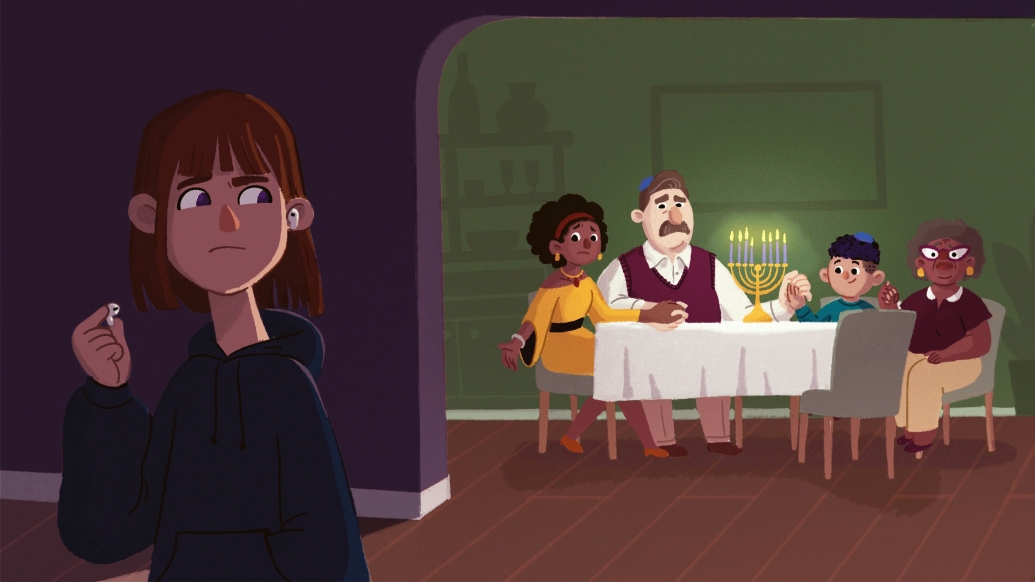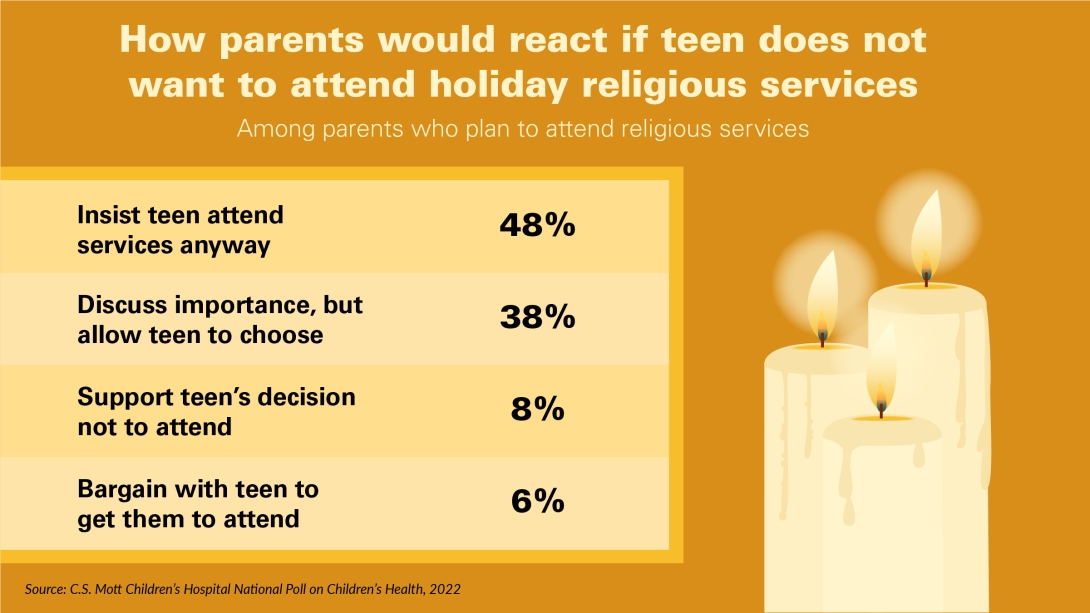Among parents who plan to attend religious services this holiday season, nearly half would insist their teen join even if they didn’t want to, a poll suggests.
12:16 PM
Author |

For some families, holiday traditions may also include midnight mass, synagogue services and other religious rituals.
But conflicts may arise if teens start showing less interest in religious activities than when they were younger children.
While half of parents in a new national poll say they’re comfortable with children and teens having a say in whether to attend religious services, 44% feel that kids shouldn’t get to choose until they’re at least 18.
The findings appear in the latest report from the C.S. Mott Children’s Hospital National Poll on Children’s Health at University of Michigan Health.
“Adolescence is a time when youth gain more independence in their beliefs and lifestyle choices, including whether to embrace their family’s faith traditions,” said Mott Poll co-director and Mott pediatrician Susan Woolford, M.D. “This may trigger tension and conflict in some families when opinions about spirituality clash, especially during the holidays.”
The nationally representative poll is based on responses from 1,090 parents with at least one child aged 13-18 surveyed between August and September 2022.
Among parents who plan to attend religious services this holiday season, nearly half would insist their teen join even if they didn’t want to while another two in five would discuss the importance but still allow their teen to make their own choice. Less than 10% of parents in this group would support their teen’s decision or bargain with them to attend.
While most parents were content with the level of their teen’s involvement in religious activities, over a third wished that their teen would participate more in faith-based services and activities.
Parents should be cautious about how hard they push teens who protest participating in spiritual activities. If adherence is achieved by force, that could diminish any positive effects of participation.
Three quarters of parents also agree that participation in religious services helps young adults connect with their family history and traditions.
“Parents may connect religion with their family traditions, which might be why they may wish to share these experiences with their kids,” Woolford said. “When teens don’t show interest or even express disdain for attending religious services, parents may feel like it’s a rejection of their cherished traditions.”

Overall, the majority of parents believe that a relationship with a higher power helps teens feel a sense of safety and security and has a positive impact on their overall wellbeing – which aligns with some research suggesting that participation in spiritual practices during adolescence is linked to health benefits in adulthood.
But just one in three parents say their teen regularly attends religious services with the family.
“Parents should be cautious about how hard they push teens who protest participating in spiritual activities. If adherence is achieved by force, that could diminish any positive effects of participation,” Woolford said. “Parents who would like their children to share their religious beliefs should try to find a balance between conveying their values and pressuring teens to conform.”
The vast majority of parents, however, believe teens can have a spiritual relationship without being involved in organized religion.
To decrease stress, if parents and teens do not agree about religion, Woolford recommends families might explore alternative ways to cultivate spirituality, such as:
- Encouraging dialogue and questions: Parents should be open to listening and understanding why their teen has different views about attending religious services. Often youth have questions about religion and spirituality and it’s helpful to allow them space to question ideas and admitting that adults don’t always have the answers. By listening to their teen’s perspectives, parents may be able to find areas of agreement to build on. “This may help teens to find an authentic spiritual relationship that is best for them,” Woolford said.
- Finding middle ground: Parents could consider giving teens a choice about certain faith traditions that are most important to the family. For example, teens could be allowed to skip weekly services, but be required to adhere to other tenets of the family religion.
- Considering expressing spirituality outside of church or formal settings: Many faith traditions value community service, social justice initiatives, and conservation efforts. The holidays offer ample opportunities for families to practice spirituality through other avenues, such as volunteering at a nursing home, serving food at a homeless shelter, or working in a community garden. “Focusing on the spirit of the season and allowing teens some flexibility with how they engage with family traditions and religious services may decrease conflict over the holidays,” Woolford said.

Explore a variety of healthcare news & stories by visiting the Health Lab home page for more articles.

Department of Communication at Michigan Medicine
Want top health & research news weekly? Sign up for Health Lab’s newsletters today!





